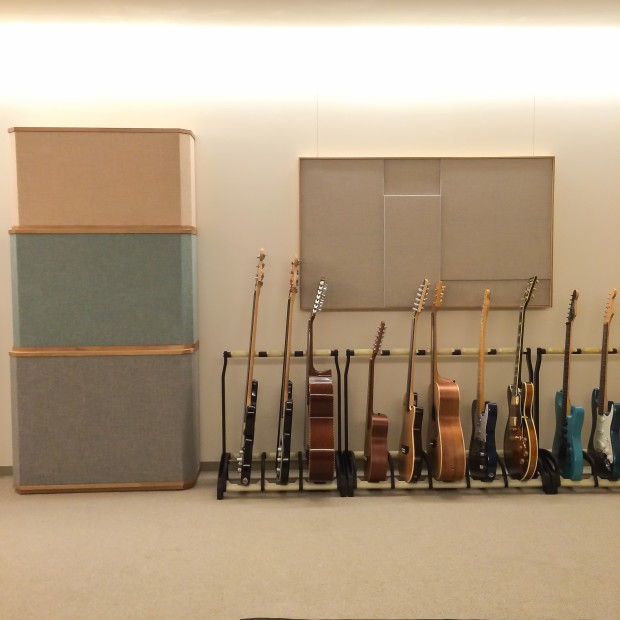On Blowing My Fuse
It’s been an eventful week. On Thursday the acoustic treatments (two of which you can see in the iPhone photo above) went into the studio along with a custom made, balanced transformer and power conditioner to run the studio’s recording and mixing electronics. You couldn’t wipe the smile off my face later that day as […]

It’s been an eventful week. On Thursday the acoustic treatments (two of which you can see in the iPhone photo above) went into the studio along with a custom made, balanced transformer and power conditioner to run the studio’s recording and mixing electronics.
You couldn’t wipe the smile off my face later that day as I sat and listened to music through the studio’s SE Munro Egg 150 monitors. The sound was great and playing acoustic guitar later in the evening reminded me how much better the room was sounding.
I knew the vibe of the room was going to change from the moment the panels (bass traps and mid range traps) came in. The silence was different. We tend to think of silence as the absence of noise. But, silence, real world silence, has certain qualities; there are different kinds of silence. The silence of a forest and the silence of a cathedral are not the same.
On Friday I recorded the latest podcast for The Society For Film. I turned off the studio monitor controller, since this kind of recording is a headphones affair. My voice sounded good and after the session I left the studio to tend to some errands, do Pilates and cook dinner.
Later in the evening I was showing some friends the studio. It was naturally quite a thrill to be presenting this new space and talking about the process of turing the room into a working space.
I pulled up a jazz playlist on iTunes and reached for the monitor controller to bring up the sound. Pressing the on switch filled the room, not with music, but with a frustrated gargle, and then the monitor controller unit’s lights flickered & went out.
Once my guests were gone, after a few glasses of mulled wine, an impromptu performance and apologies about the faulty gear, I came back and pulled the unit out of the rack. The culprit was a blown fuse or, more precisely, my failure to change the fuse before firing up the rig.
In Singapore my gear all ran on 230V. Tokyo has 100v power. Most of my gear won’t run on 100v, but it will run on 115V. So, I’m running a unit to convert the local power to 115V. Switching the gear so it can receive 115V instead of 230V is mostly just a matter of flicking a power setting switch, but on some units, you also need to change the fuse as well (for those who remember their electrical theory, this is because of Watt’s Law).
It was at this point, late in the night, alone in my studio, once I had realised the problem, when I got a little upset with myself. This was a rookie mistake. We call it learning from experience but, sometimes, it just feels like learning from embarrassment.
The good news is, this gives me another excuse to go visit Akihabara, the Tokyo district famed for having excellent electronics stores. I might just, while shopping for fuses, have to take a look at some new cables, connectors. lights and other bits and pieces. Now I have a working studio, it’s time to pimp it up a little and, of course, give it a name.




